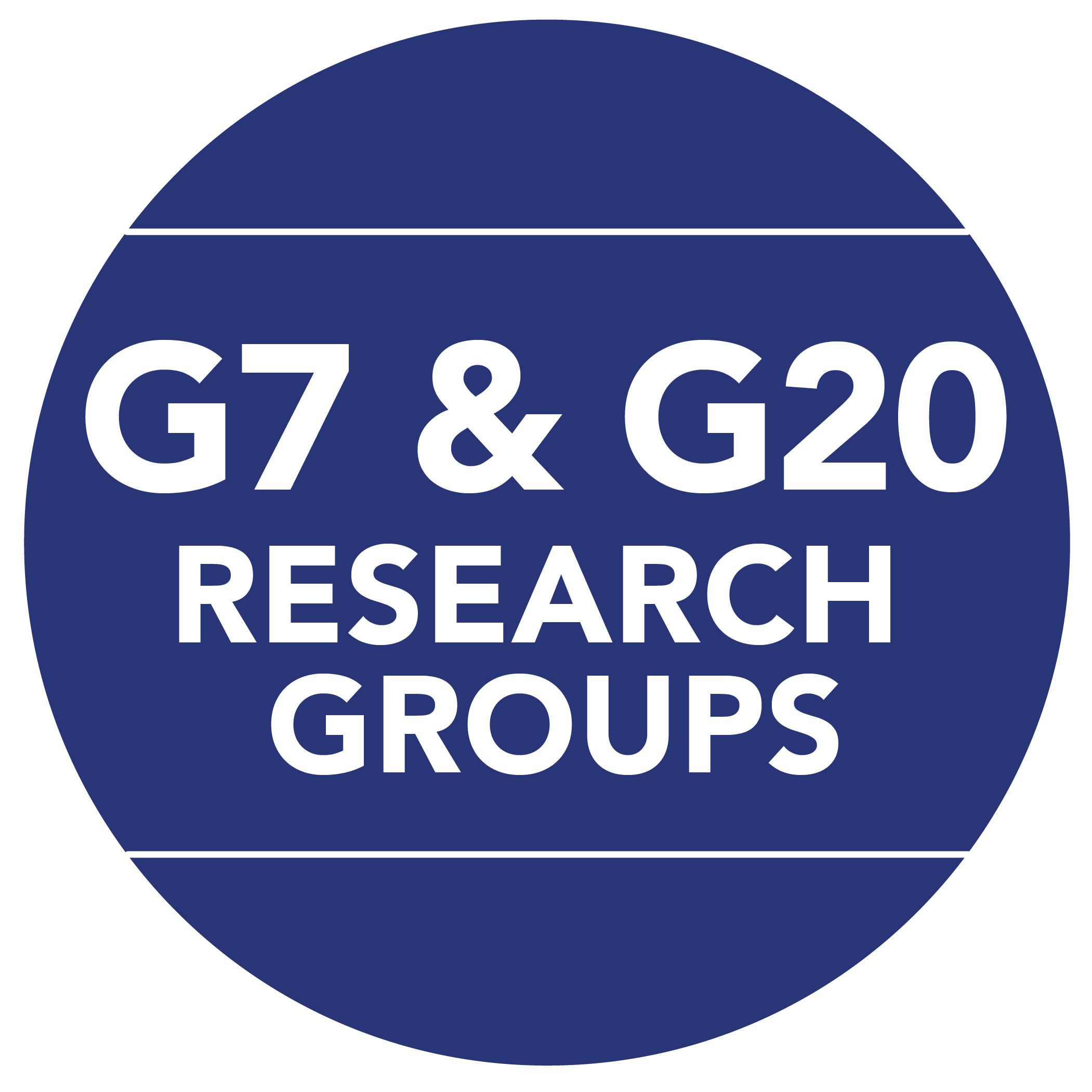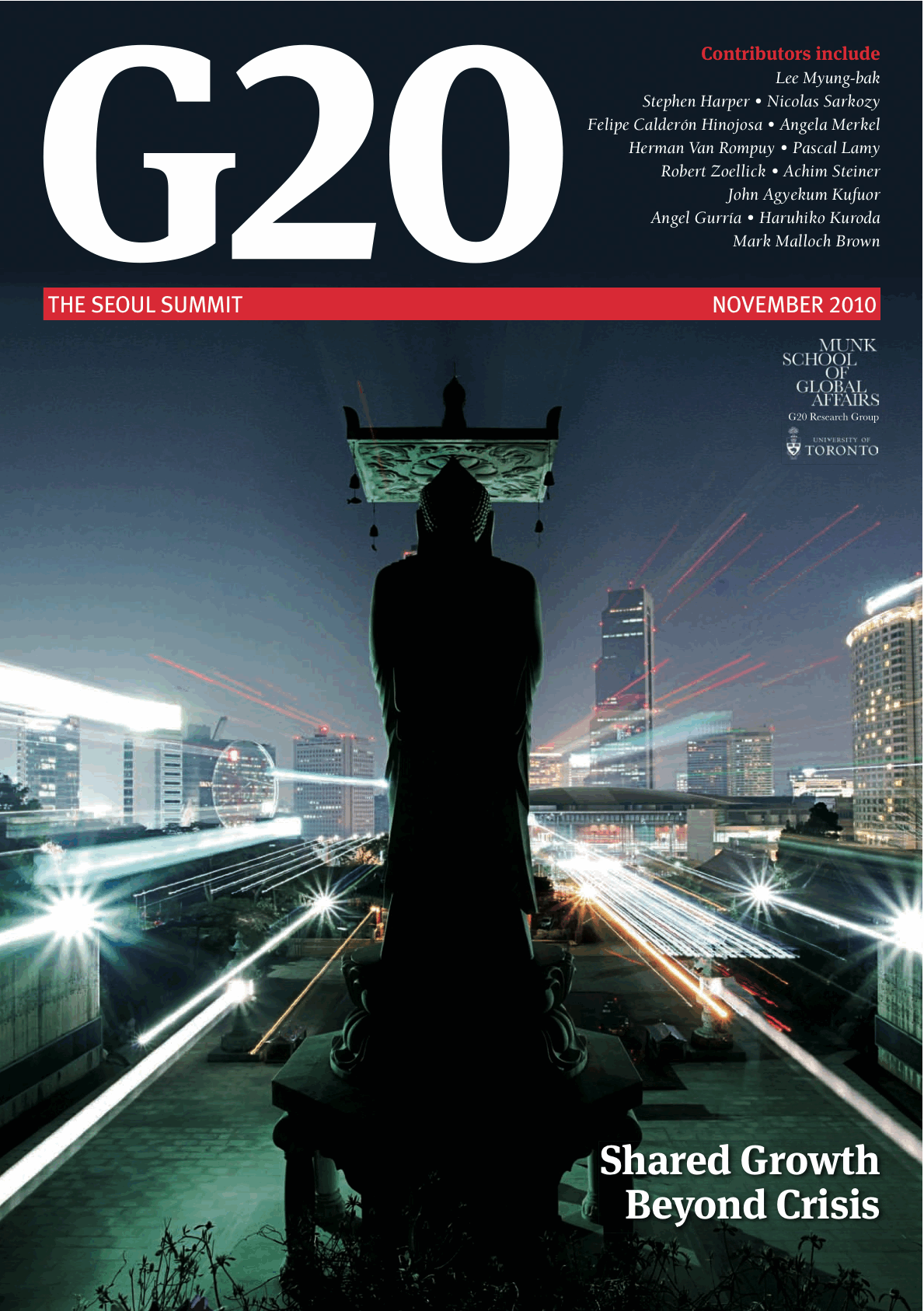

 |
 |
|

The road to Seoul:
shared growth beyond crisis
By Lee Myung-bak, President, Republic of Korea
[Korean]
Policy coordination will drive the world toward sustainable and balanced growth
To download a low-resolution pdf, click here. (Be patient! It's 50 MB.)
The world economy faces a period of great uncertainty, buffeted by crisscrossing currents as it continues its recovery from the global financial crisis. However, the one fixed point amid the uncertainty is the assurance that the close economic cooperation among the G20 members forged during the recent crisis will continue to serve the world well in the future.
Although the global economy still faces many challenges, there can be little doubt that the unprecedented level of policy cooperation among the G20 countries takes much of the credit for steering the world economy away from potentially much worse outcomes. The newfound status of the G20 as the premier forum for international economic cooperation owes much to its proven successes to date.
As the leader of the country that chairs the G20 and hosts the leaders’ summit in November, I promise that the G20 will continue its important role in coordinating policies to guide the global economy toward recovery.
But the G20 is about more than just crisis management. The Seoul Summit will see the G20 take a decisive step toward greater policy coordination. This year the G20 will build the platform for longer-term economic cooperation that will ensure the sustained and balanced growth of the world economy in the months and years ahead. For this reason, the motto for the Seoul Summit is ‘shared growth beyond crisis’.
No one should underestimate the size of the task. Ironically, the proven success of the G20 presents greater challenges for policy coordination going forward. While the crisis was raging, the necessity of achieving policy coordination was easily impressed on everyone. As the immediate crisis abates or morphs into regional crises, policymakers need to be on their guard against complacency.
In addition, there may be legitimate differences in views on the appropriate pace and sequencing of exit strategies and the sustainable level of public debt. However, there is a shared recognition of the importance of cooperation, even if there are different opinions on the optimal course to chart. Everyone knows that the effectiveness of each country’s economic policy is enhanced when pursued in concert with others. Such shared recognition means that there is much common ground to build on.
The to-do list for the Seoul Summit is long and formidable.
In Seoul, the G20 leaders are expected to pledge to implement financial sector reform to strengthen bank capital and liquidity standards and to address systemically important financial institutions and resolution issues. The new rules will build a more resilient financial system that serves the needs of the world’s economies, reduces moral hazard, limits the build-up of systemic risk and supports stable economic growth.
The G20 is also expected to reach an agreement on the reform of the governance of the International Monetary Fund (IMF), following up on the pledges made by the leaders in previous summits. Modernising the IMF's governance to reflect the relative weights of its member countries in the world economy is an essential element in maintaining the institution’s credibility, legitimacy and effectiveness.
As a separate agenda item, Korea is working closely with the IMF on proposals to strengthen a global financial safety net that can help countries deal with capital volatility, financial fragility and crisis contagion with a pre-emptive response to financial markets that become disconnected from economic fundamentals.
The Seoul Summit will also mark a significant milestone for the Framework for Strong, Sustainable and Balance Growth, where policy coordination can be given substance in terms of specific roles for each member country. In this way, the world will move beyond finger pointing on the causes of the crisis, and turn to the forward-looking task of steering the global economy with common purpose.
In previous contributions to this summit publication, I have emphasised the importance of recognising the broader notion of balanced and sustainable growth, beyond achieving balance in a narrowly macroeconomic sense. The broader notion of rebalancing includes closing the gap between advanced and developing countries. Korea has placed this task firmly on the agenda for the G20 through its development initiative.
At the Toronto Summit in June, the leaders set up the Development Working Group, which is chaired by Korea and South Africa, to develop a distinctive development agenda for the G20 that can complement existing approaches.
The by-word of the Korean initiative is economic growth, and how a period of sustained economic growth can be an effective remedy for poverty. Korea is a country with first-hand experience of economic development that propels a country out of poverty — all within the living memory of a substantial fraction of its population. Korea has also experienced the devastating impact of a financial crisis and understands the efforts necessary to secure a robust recovery.
For these reasons, Korea has considerable street credibility when it comes to development issues. However, Korea’s experience cannot always be translated directly into off-the-shelf solutions for other countries. The task for the Development Working Group is to distill the lessons that can be applied more broadly into a set of G20 development principles, which will then be backed up with specific undertakings by the G20 leaders.
In placing development as a core agenda item, Korea is keenly aware that many developing countries are not represented in the G20. Korea is conducting extensive outreach efforts through consultations with international organisations. It is conscious of the importance of ensuring that the fruits of strong and sustainable growth are shared evenly among all countries, including the poorest.
Although the financial crisis brought the G20 together and forged an effective coordinated crisis response, it is now incumbent on the global community to translate the momentum that has been generated toward establishing a forum that can take a genuine global leadership role for longer-term issues. The Seoul Summit will play a decisive part in ensuring shared growth beyond crisis.
|
This Information System is provided by the University of Toronto Library |
All contents copyright © 2024. University of Toronto unless otherwise stated. All rights reserved.